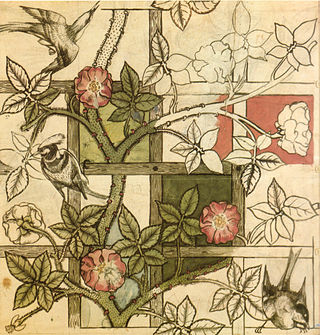
The Arts and Crafts movement was an international trend in the decorative and fine arts that developed earliest and most fully in the British Isles and subsequently spread across the British Empire and to the rest of Europe and America.

Beaminster is a town and civil parish in Dorset, England, approximately 15 miles (24 km) northwest of the county town Dorchester. It is sited in a bowl-shaped valley near the source of the small River Brit. The population of Beaminster parish was recorded as 3,177 in the 2021 census.

Gustav Stickley was an American furniture manufacturer, design leader, publisher, and a leading voice in the American Arts and Crafts movement. Stickley's design philosophy was a major influence on American Craftsman architecture.

George Katsutoshi Nakashima was an American woodworker, architect, and furniture maker who was one of the leading innovators of 20th century furniture design and a father of the American craft movement. In 1983, he accepted the Order of the Sacred Treasure, an honor bestowed by the Emperor of Japan and the Japanese government.
Jeremy Broun is a British furniture designer maker, writer, film maker and musician.
Tage Frid was a Danish-born woodworker, educator and author who influenced the development of the studio furniture movement in the United States. His design work was often in the Danish-modern style, best known for his three legged stool and his publications.
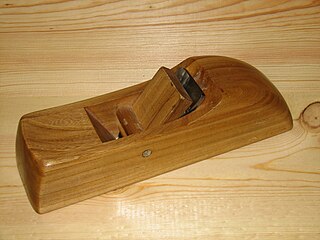
James Krenov was a woodworker and studio furnituremaker.
Po Shun Leong is an English artist, former architect, sculptor and furniture maker. He was born at Northampton, England, and educated at the Quaker Leighton Park School in Berkshire, and then at the Architectural Association School of Architecture, in London, and has resided in Southern California since 1981. He is also known since the late 1980s for his highly intricate one-of-a-kind wood boxes, some now in museum collections. The Landscape box, a constantly evolving series since 1983 is architectural in character and built up of many different woods in their natural colors. They are inspired from ancient or legendary civilizations. He maintains a studio in the garden of his residence in the City of Winnetka in the San Fernando Valley, north west of Los Angeles. He continues to make elaborate wood objects and is developing a line of simple, sculpturally-inspired furniture.
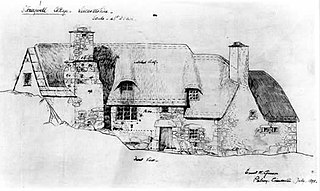
Ernest William Gimson was an English furniture designer and architect. Gimson was described by the art critic Nikolaus Pevsner as "the greatest of the English architect-designers". Today his reputation is securely established as one of the most influential designers of the English Arts and Crafts movement in the late nineteenth and early twentieth centuries.

Amish furniture is furniture manufactured by the Amish, primarily of Pennsylvania, Indiana, and Ohio. It is generally known as being made completely out of wood, usually without particle board or laminate. The styles most often used by the Amish woodworkers are generally more traditional in nature.

Wharton Esherick was an American artist and designer. An artistic polymath, he worked in a wide variety of art media including painting, printmaking, and sculpture. His design works range from architectural interiors to handheld, tactile objects like light pulls and chess pieces. Esherick is best known for his wood furniture, which synthesizes modernist sculptural form with functional craft. His influence was keenly felt within the genre of Postwar studio craft, where he has been called the “father of studio furniture” and the “dean of American craftsmen.” The sculptor and furniture designer Wendell Castle cited Esherick as a formative influence. Castle credited Esherick with demonstrating that "furniture could be a form of sculpture," the "inherent tree characteristics in the utilization of wood," and the "importance of the entire sculptural environment."
Jere Osgood was an American studio furniture maker, and teacher of furniture and woodworking. He taught for many years in the Boston University Program in Artisanry.
Rupert Williamson has been a Designer and creator of one-off furniture for over 40 years with work in many museums and public collections, together with his work written about and illustrated in many books and articles.In 1999 he received a PhD for his thesis “New Forms of Imagery in Furniture". The Reflections of a Designer working in the Craft Revival of the 1970s and beyond” together with a major collection of his designs.
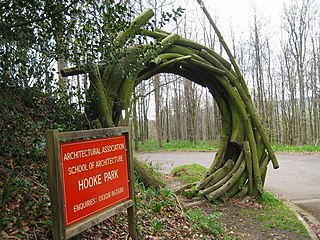
Hooke Park is a 142 hectare woodland in Dorset, South West England located near the town of Beaminster and within the Dorset National Landscape area. The site is designated as ancient woodland and historically comprised a deer hunting estate. An educational campus is located at Hooke Park that was developed by the Parnham Trust following its purchase of the site in 1983. Led by furniture designer John Makepeace a School of Woodland Industries was established that aimed to "research, demonstrate and teach the better use of forest produce". The campus buildings demonstrate experimental timber construction techniques and include works by the late 2015 Pritzker Prize laureate Frei Otto, Edward Cullinan and ABK Architects.

Parnham House is a sixteenth-century Grade I listed house located about 1 mile (1.6 km) from Beaminster in Dorset, England. Historic England describes the house as "exceptionally important". In April 2017 the house was badly damaged by fire.
Ann Sutton is a British artist, author, educator and broadcaster. She gained international recognition as an innovative textile artist and designer from the 1950s and has continued to develop her making and research in other media to the present day.

Konstantin Grcic, born 1965, is a German industrial designer known for his design of furniture and household products, some of which have been featured in design shows and museums. His design language is characterized by the use of geometric shapes and unexpected angles.

Arthur Romney Green was an English craftsman and furniture designer, based in Christchurch, Hampshire. His furniture carries influence of the Arts and Crafts style, popularized by William Morris in the 1880s. Some examples of Romney Green's furniture are exhibited in Christchurch Priory, All Saints Church in Catherington, Hampshire, and the Victoria and Albert Museum in Brompton, London. He was the elder brother of the English architect William Curtis Green.
Aspen Golann is an American woodworker who produces furniture.
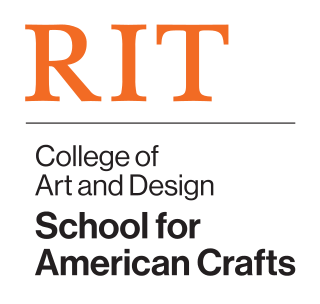
The School for American Crafts was founded by Aileen Osborn Webb and the American Craftsmen's Council (ACC) in the 1940s. It sought to provide training in traditional crafts and "to develop and raise the standards of the hand arts in the United States."












